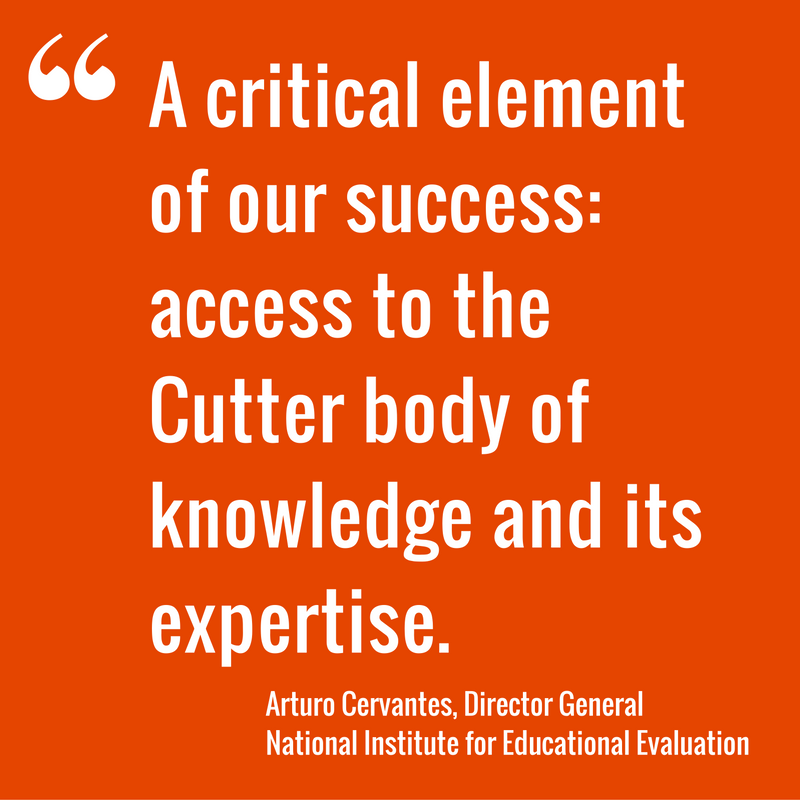Here's a Start ...
Here is a selection of recent research by Cutter experts you can access immediately. As a Cutter community member, you'll have access to every new piece of research on sustainability, technology, leadership, and industry, plus all of our timeless business and technology strategy insights. This includes more than 20 years of articles from our flagship journal, Amplify (formerly Cutter Business Technology Journal.)
Search our archives for a taste of all that's available once your subscription is activated.
Advisor
Overcoming Barriers to Tech-Enabled Healthcare Partnerships
Daniel Rees, Roderick Thomas, Victoria Bates, Gareth Davies
This Advisor distills insights from interviews with 48 healthcare and pharmaceutical leaders on the challenges and best practices for cross-sector collaboration using data and technology platforms. Key barriers include trust, governance complexity, misaligned incentives, and limited scalability. Success hinges on shared agendas, clear accountability, streamlined contracts, and strong leadership — all essential for embedding technology in a way that delivers lasting value to stakeholders.
Article
Disciplining AI, Part II: Looping in Humans, Systems & Accountability — Opening Statement
Eystein Thanisch
Part II of this Amplify series on disciplining AI explores how to rigorously evaluate and govern systems amid rising concerns over safety, performance, and accountability. As GenAI plateaus in both capability and ROI, this issue argues for a shift from benchmark-based assessments to context-specific evaluations emphasizing oversight, adaptability, and explainability. It offers philosophical and technical frameworks for aligning AI outputs with human-defined goals — underscoring that effective AI integration demands continuous learning, human judgment, and strategic foresight.
Article
Beyond the Benchmark: Developing Better AI with Evaluations
Dan North
ADL’s Dan North examines the engineering discipline of AI evaluations, arguing that this is the locus of an LLM’s translation from task-agnostic capabilities measured by benchmarks to tech that is setting specific and ready-to-deliver success. North emphasizes the ultimately human nature of this discipline. An organization must define the kind of outputs it is looking for through an inclusive process involving customers and stakeholders, alongside engineers.
Article
Accountable AI?
Paul Clermont
Paul Clermont reminds us of a crucial but under-recognized trait of true AI: learning and improvement in response to feedback independent of explicit human design. The implementation of human requirements is thus both highly feasible and dialogic. Clermont stresses the high level of responsibility borne by humans when interacting with AI. Critical thinking about inputs and outputs, and awareness of both objectives and social context, remain firmly human (and sometimes regulatory) responsibilities — no matter how widely terms like “AI accountability” have gained currency.
Article
Why Judgment, Not Accuracy, Will Decide the Future of Agentic AI
Joe Allen
Joe Allen joins the critique of benchmarks as the key means of measuring AI systems, with a focus on agents. Given the open world in which they operate, agents have autonomy over both planning and execution, and Allen argues they have already outgrown even the criteria used to evaluate LLMs. As self-organizing systems, agents should be assessed on their ability to follow their own plans consistently while adapting to unforeseen eventualities — an evaluation that cannot be fully scripted in advance. Drawing on direct experience, Allen details a suite of techniques that can be used to track and improve agent performance in terms of internal coherence, adherence to a context model, and more.
Article
AI Asset Survival in the Age of Exponential Tech
Chirag Kundalia, V. Kavida
Chirag Kundalia and V. Kavida propose using survival analysis to understand when, and under what circumstances, an AI system might need maintenance or replacement. This approach involves modeling the intrinsic and extrinsic factors that could render a system no longer fit for purpose. It also requires organizations to define the standard of output the system must deliver, monitor that performance, and scan the horizon for relevant externalities (e.g., superior technology). Although survival analysis cannot anticipate every eventuality, modeling the future of an AI system enhances budgeting, compliance reporting, and strategic planning.
Article
Taco Bell, 18,000 Waters & Why Benchmarks Don’t Matter
Michael Papadopoulos, Olivier Pilot, Eystein Thanisch
ADL’s Michael Papadopoulos, Olivier Pilot, and Eystein Thanish argue that with model performance plateauing, the critical differentiator for AI in 2025 is how the technology is integrated into the specifics of an organization — and the context in which it will operate. Benchmarking, which is concerned with models out of context, is of diminishing applicability. After reviewing some entertaining but troubling examples of theoretically capable AI systems disconnecting disastrously from data, business rules, and basic plausibility, they propose an evaluation framework more attuned to contemporary challenges to prevent similar outcomes.
Advisor
Building Ethical Boards Through Leader Character
Trevor Hunter
This Advisor explores how leader character can strengthen board governance and support ethical, effective decision-making in the face of growing ESG demands. It argues that traits such as courage, integrity, humility, and judgment are essential for directors to fulfill their fiduciary duties while navigating complex stakeholder expectations. By embracing character-driven leadership, boards can move beyond compliance to shape resilient, purpose-led organizations capable of long-term value creation.
Advisor
Raising the Bar for Nature-Based Solutions
Catherine Drumheller, Matthew Ling, Laura Lawlor
This Advisor introduces a practical, integrated methodology for evaluating the holistic benefits of nature-based solutions (NbS). It addresses the shortcomings of current valuation approaches — either overly simplistic or excessively complex— by combining qualitative and quantitative measures within a structured multi-criteria analysis framework. The proposed benefit-screening method enables decision makers to transparently assess NbS across environmental, social, and economic dimensions.
Advisor
A Simulation-First Case Study: Rethinking AI’s Role in Clinical Decision-Making
Joseph Farrington
This Advisor presents a case study from a major London hospital, showing how a simulation-first approach can guide AI model development in complex clinical settings. By simulating blood bank operations, the team assessed the potential value of predictive models before investing in data acquisition and model training. The simulation revealed that even moderately accurate predictions could reduce waste, especially when combined with optimized ordering policies. Beyond technical insights, the process fostered early stakeholder collaboration, ensuring the final model addressed real-world needs.
Advisor
Leading the Leadershift: Rethinking Transformation from the Top Down
Jeremy Blain
This Advisor urges leaders to move beyond surface-level digital upgrades and confront the deeper cultural and strategic shifts required for true transformation. By focusing on digital ambition, data-driven decision-making, and organizational alignment, it provides a roadmap for boards and executives to overcome inertia, reengage their teams, and lead with purpose in a rapidly evolving digital landscape.
Advisor
The Hidden Sustainability of Hydropower
Shannon Ames, Whitney Stovall
This Advisor explores the often-overlooked sustainability potential of hydropower — highlighting how long-standing facilities are evolving to support environmental stewardship, community engagement, biodiversity, and transparent governance. From adaptive river management to educational outreach and innovative turbine designs, hydropower is demonstrating its capacity to deliver more than just renewable energy.
Advisor
On-Orbit Data Centers: Mapping the Leaders in Space-Based AI Computing
Curt Hall
This Advisor, Part II in a series that explores the current state of on-orbit data centers, spotlights the countries, companies, and initiatives leading their development. From national space agencies to emerging start-ups, it maps the key players building space-based computing infrastructure — transforming satellites into intelligent, autonomous systems that can process data in real time.
Advisor
Balancing the Boardroom with Lead Independent Directors
Alessia Falsarone
This Advisor explores the growing importance of lead independent directors (LID) in strengthening board oversight, especially in firms with concentrated leadership or weak governance. The LID plays a key role in balancing power, fostering accountability, and enhancing investor trust — but only when backed by real authority and engagement.
Advisor
Embedding Purpose to Achieve Real SBT Results
Kelly Cooper, Neil Hawkins
This Advisor argues that many firms abandon sustainable business transformation (SBT) too soon, overlooking its proven financial, cultural, and societal benefits. Success depends on a Constancy of Purpose — an enduring, organization-wide commitment that embeds sustainability into strategy, avoids greenwashing, and positions companies to achieve lasting growth and resilience.
Advisor
Governing the Quantum Frontier
Guido Peterssen Nodarse, Jose Luis Hevia
This Advisor argues that to unlock the full potential of private quantum hubs (PQHs), organizations must implement centralized governance systems tailored to the unique demands of quantum ecosystems. These systems must coordinate diverse technologies, manage hybrid architectures, and ensure secure, scalable access for a broad spectrum of users. Without such purpose-built governance, PQHs risk inefficiency and fragmentation — undermining their role as key enablers of enterprise quantum innovation.
Advisor
Bridging the Board–Management Gap with AI
David Larcker, Amit Seru, Brian Tayan, Laurie Yoler
As this Advisor explores, AI is transforming corporate governance by narrowing the information gap between boards and management. With greater access to data and analysis, directors can exercise more informed oversight— but face higher expectations, new legal questions, and cybersecurity risks.
Advisor
7 Pillars of a Universal Carbon Accounting System
Enrique Castro-Leon, Katrina Pugh, Jose Zero
This Advisor introduces the seven essential practices of a cross-industry generally accepted carbon accounting principles system. It outlines how transparent, interoperable, and verifiable carbon accounting creates opportunities for market differentiation and presents a blueprint for a reliable, global carbon ledger that supports business accountability and climate action.
Article
Disciplining AI, Part I: Evaluation Through Industry Lenses — Opening Statement
Eystein Thanisch
In Part I of this two-part Amplify series on AI evaluation, we explore the impetus toward AI accountability that arises from tackling real problems in real-world settings. Understanding how AI can contribute, at what cost, and with what nth order effects in a given context requires rigorous socio-technical systems thinking.
Article
Explain Yourself: The Legal Requirements Governing Explainability
Rosie Nance, Marcus Evans, Lisa Fitzgerald, Lily Hands
As Marcus Evans, Rosie Nance, Lisa Fitzgerald, and Lily Hands explore, AI explainability is a legal requirement as well as a scientific challenge. Despite the EU and UK’s differing approaches in other aspects of AI regulation, both the EU and UK GDPR continue to uphold individuals’ right to an explanation of automated or semiautomated decisions that impact them significantly. The EU AI Act also provides a right to an explanation for individuals or organizations.






















